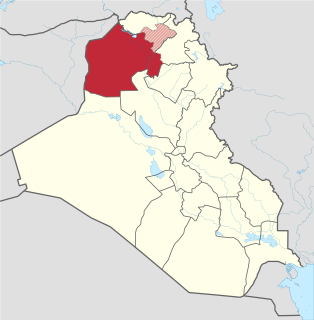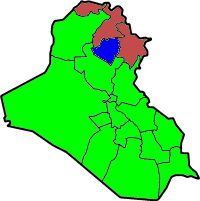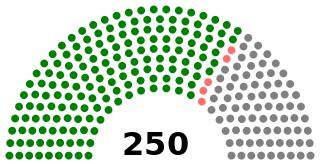
The politics of Tunisia takes place within the framework of a unitary semi-presidential representative democratic republic, with a President serving as head of state, Prime Minister as head of government, a unicameral legislature and a court system influenced by French civil law. Between 1956 and 2011, Tunisia operated as a de facto one-party state, with politics dominated by the secular Constitutional Democratic Rally (RCD) under former Presidents Habib Bourguiba and then Zine el Abidine Ben Ali. However, in 2011 a national uprising led to the ousting of the President and the dismantling of the RCD, paving the way for a multi-party democracy. October 2014 saw the first democratic parliamentary elections since the 2011 revolution, resulting in a win by the secularist Nidaa Tounes party with 85 seats in the 217-member assembly.

Kirkuk Governorate or Kirkuk Province is a governorate in northern Iraq. The governorate has an area of 9,679 square kilometres (3,737 sq mi). In 2017 the estimated population was 1,259,561 people. The provincial capital is the city of Kirkuk. It is divided into four districts.

Nineveh Governorate is a governorate in northern Iraq that contains the ancient Assyrian city of Nineveh. It was an integral part of Assyria from the 25th century BC to the 7th century AD. It has an area of 37,323 km2 (14,410 sq mi) and an estimated population of 2,453,000 people in 2003. Its chief city and provincial capital is Mosul, which lies across the Tigris river from the ruins of ancient Nineveh. Tal Afar is the second-biggest city. Before 1976, it was called Mosul Province and included the present-day Dohuk Governorate, which is now part of the autonomous Iraqi Kurdistan.

The Council of Representatives is the unicameral legislature of the Republic of Iraq. It is currently composed of 329 seats and meets in Baghdad inside the Green Zone.

North Governorate is one of the governorates of Lebanon. Its capital is Tripoli.

The Bethlehem Governorate is one of 16 Governorates of Palestine. It covers an area of the West Bank, south of Jerusalem. Its principal city and district capital is Bethlehem. According to the Palestinian Central Bureau of Statistics, its population was estimated to 199,463 in 2012.
The Dhi Qar governorate election of 2009 was held on 31 January 2009 alongside elections for all other governorates outside Iraqi Kurdistan and Kirkuk.
The Karbala governorate election of 2009 was held on 31 January 2009 alongside elections for all other governorates outside Iraqi Kurdistan and Kirkuk.
The Maysan governorate election of 2009 was held on 31 January 2009 alongside elections for all other governorates outside Iraqi Kurdistan and Kirkuk.
The Najaf governorate election of 2009 was held on 31 January 2009 alongside elections for all other governorates outside Iraqi Kurdistan and Kirkuk.
The Al-Qādisiyyah governorate election of 2009 was held on 31 January 2009 alongside elections for all other governorates outside Iraqi Kurdistan and Kirkuk.

There are four Governorates in Bahrain; the Capital, Northern, Southern and Muharraq. There had previously been five until September 2014, when the Central Governorate was abolished.

Governorate or provincial elections are due to be held in Arbil Governorate in 2009 to replace the governorate council elected in the Iraqi governorate elections of 2005. The remaining governorates outside Iraqi Kurdistan held elections on 31 January 2009. The election will follow the Iraqi Kurdistan legislative election, 2009.

Governorate or provincial elections are due to be held in Dahuk Governorate in 2009 to replace the governorate council elected in the Iraqi governorate elections of 2005. The remaining governorates outside Iraqi Kurdistan held elections on 31 January 2009. The election will follow the Iraqi Kurdistan legislative election, 2009.

Governorate or provincial elections are due to be held in Sulaymaniya Governorate in 2009 to replace the governorate council elected in the Iraqi governorate elections of 2005. The remaining governorates outside Iraqi Kurdistan held elections on 31 January 2009. The election will follow the Iraqi Kurdistan legislative election, 2009.
List of the Martyr al-Mehraab and the Independent Forces,, commonly known as the al-Mehraab Martyr List was a Shi'a Islamist, Iraqi political coalition formed for the Iraqi governorate elections, 2009 by the Islamic Supreme Council of Iraq.

Governorate or provincial elections were held in Iraq on 20 April 2013, to replace the local councils in the governorates of Iraq that were elected in the Iraqi governorate elections of 2009. Elections took place in 12 of Iraq's 18 governorates. Elections didn't take place in the 3 governorates forming the Kurdistan Region or Kirkuk, Anbar, or Ninevah, meaning that a total of 378 provincial council seats were up for election.

Administrative divisions of Ukraine in 1918–1925 was inherited from the Russian Empire and was based on the system of gubernias (provinces) divided into powiats (counties) and volosts. New administrative reform was adopted by the Central Council of Ukraine on March 4, 1918, which saw restructuring the subdivision of Ukraine based on a new system of lands and abolishing system of gubernias and powiats. Implementation of the new system was never fully realized and after the Skoropadsky's coup-d'etat on April 29, 1918, was abandoned.

Parliamentary elections were held in Syria to elect the People's Council on 13 April 2016. Syria's parliamentary elections occur every four years, with the last in 2012, while presidential elections are done every seven years, with the last in 2014. The current parliamentary term ends in 2020, which is consequently the planned date for the next parliamentary election.
















